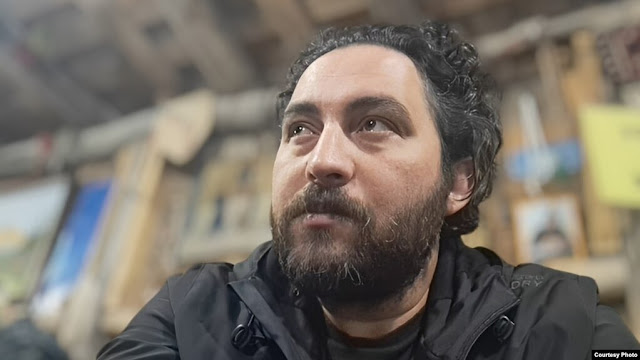By Alirza Quluncu, Voice of America, June 18, 2023
 |
| Ruzbeh Saadati, writer and civil activist |
Recently, negative and unpleasant remarks about Tabriz shared by many users on Persian-language social media have sparked controversy. Some users have complained that when they visit Tabriz, everyone speaks Turkish, and the locals refuse to speak Persian with them.
Negative posts about Tabriz began to surge in recent weeks after a 35-second video was circulated on social networks like Twitter and Instagram. The short video, shot in the style of the American filmmaker Wes Anderson—a recent trend—was shared under the title "A Friday Morning in Tabriz."
“This time, it started with a video—a video mimicking the style of a director named Anderson. It was about Tabriz, but it didn’t really depict Tabriz... The main point of the video was that it showed Tabriz as somewhat beautiful. Whenever Azerbaijan, Tabriz, or Turkish identity are associated with beautiful, modern, and stylish elements, there’s a backlash. After that video, some objections began, and they attacked. Some people started writing about their experiences, claiming, ‘This is how we were treated in Tabriz.’ Others targeted Turks,” said Saadati.
Saadati argues that the video became an excuse to resurface and amplify pre-existing negative perceptions of Tabriz.
“This video was just an excuse that gathered all the negative views from recent months under one banner. Similar reactions against Tabriz existed before. In general, there’s a certain view toward Tabriz in non-Turkish regions. Part of this is orchestrated—this perspective is partly shaped by media and the authorities.”
According to Saadati, some individual behaviors in Tabriz are deliberately generalized and presented as characteristics of all Tabriz residents.
He explained, “Even in other Turkish cities, this view of Tabriz might exist. It’s not based on objectivity but stems from propaganda. Of course, certain behaviors and attitudes exist in Tabriz, as they do in other places. But this issue is never generalized elsewhere in Iran. No one attributes an individual’s behavior or personal experience to an entire city anywhere else in Iran. They only do this with Tabriz and, broadly, with Azerbaijan. They generalize Tabriz to all Turks. For instance, if someone visits Yazd and has a bad experience, they don’t associate it with all Yazd residents. This kind of generalization is uniquely applied to Tabriz.”
Some social media users have claimed that in Tabriz, people refuse to speak Persian with them and even respond in Turkish when asked for directions.
Saadati acknowledged that the people of Tabriz insist on speaking Turkish, but he described some of the claims as exaggerated.
“There is a tendency in Tabriz to speak Turkish, but generalizing this to such an extent is not accurate. I don’t believe the claims about people refusing to give directions. These days, with so many apps, people rarely ask for directions. And even if they do, there will definitely be someone in Tabriz who responds in Persian. However, it’s true that this behavior exists in Tabriz—just as it does elsewhere. The issue is that no one investigates whether, for example, in Mughan, everyone gives directions in Persian, while in Tabriz, no one does... These claims primarily target Tabriz. Tabriz is a stronghold for Turks—it’s the main bastion of our identity and Turkish heritage. In their minds, Tabriz symbolizes resistance. They see Tabriz as untransformed, unyielding.”
Saadati stated that Tehran tries to impose its identity, language, and even its concerns and aspirations on other regions, but Tabriz resists.
“Tehran, meaning the center, has always tried to rebuild itself elsewhere. By ‘elsewhere,’ I mean all non-Persian regions of Iran. This reconstruction effort spans all domains. The center seeks to impose its language, culture, and even its concerns on the periphery. By the center, I mean both the state and a segment of society. There’s a group in the center that wants to see their past, their vision for the future, their aspirations, and their concerns reflected everywhere else. They expect, for example, someone living in Zahedan to share the same concerns as Tehran’s middle class. But the point is, they can’t achieve this in Tabriz—not to the extent they wish,” he said.
Saadati added, “There has always been resistance to the center in Tabriz. Politically, Tabriz has always been a counterweight to the center. They cannot assimilate Tabriz. Their reactions toward Tabriz are rooted in this inability. Symbolically, Tabriz remains unconquered in their view. That’s why they react to everything in Tabriz that they perceive as different from Tehran and the center.”
Link to the original interview in Turkish on the Azerbaijani section of Voice of America:
Ruzbeh Səadəti: Təbrizi Tehrandan fərqləndirən hər şeyə reaksiya verirlər
